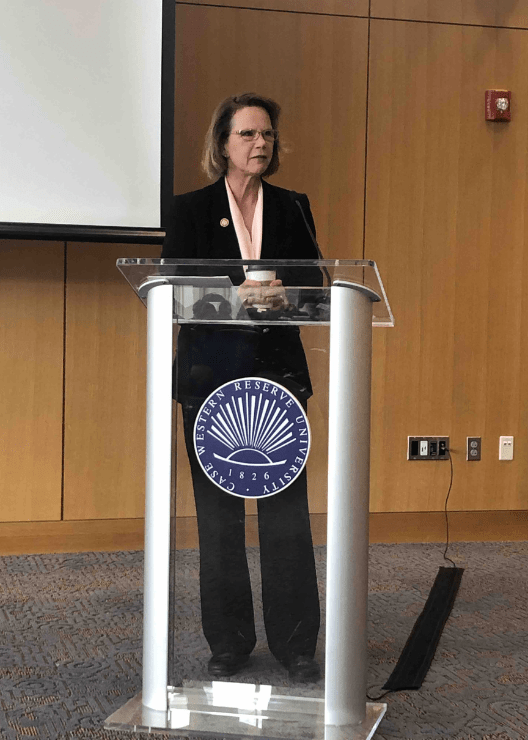On April 5, Ohio Supreme Court Chief Justice Sharon L. Kennedy offered her advice on best oral argument practices to first-year law students—just in time to help them prepare for their own simulated oral arguments in LLEAP, CWRU School of Law’s required, year-long legal research, writing and experiential skills course.
Kennedy presented her inspiring story. She began her career in the justice system as a police officer. Following law school, she opened her own practice serving families and juveniles. In 1999, she became a judge in the Domestic Relations Division in the Butler County Court of Common Pleas. She is now the Ohio Supreme Court’s 11th Chief Justice, and the second woman to serve in that role.
In giving advice to the 1L class for their upcoming oral arguments, Kennedy emphasized that attorneys should focus on—not shy away from—the most disputed aspects of a case. At the most practical level, she advised students to make eye contact with judges, speak at a measured pace and avoid reading off of notes. Balancing professionalism and advocacy requires attorneys to stop talking as soon as a judge makes a sound, and to answer judges’ questions directly, even if conceding a point.
Kennedy peppered her presentation with self-reflections that proved how even the most successful attorneys must devote extensive time, if not a lifetime, to intense contemplation, practice and preparation for oral argument. She noted her own tendency, as she has been told, to “look mean” when she engages on a serious matter, so she reminds herself to relax and smile more when she presents. And she expressed genuine wonder at attorneys who keep so much information in their heads that they can, without notes, shoot out case names and arguments when answering judges’ questions, and then return without pause to the proper point in their “roadmapped” argument.
Responding to a student’s question about tips for first-time oral arguers, Kennedy suggested that young lawyers take time to learn about what kind of speaker they are. She recommended that students practice before a mirror or an audience, and learn their default behaviors: Do you fidget, sway or wave your hands? Avoid eye contact? Use “um” to fill a pause? According to Kennedy, the best oral arguers practice adjustments to those patterns until they are no longer habits.


